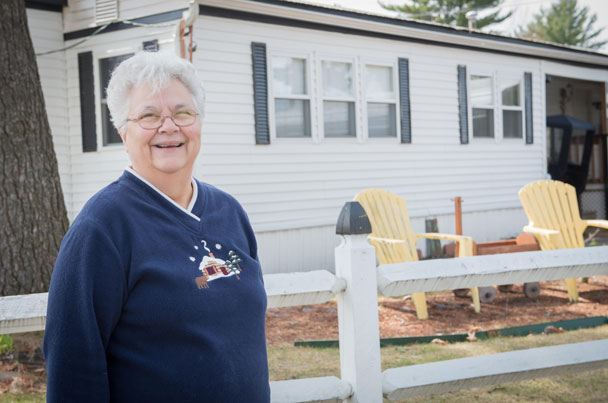Manufactured homes part of solution to NH's affordable housing crisis
N.H. Community Loan Fund has solutions
While New Hampshire's businesses and communities struggle to find housing for the workers they need, the N.H. Community Loan Fund has helped create or preserve 1,270 affordable manufactured homes during the past three years, while also providing mortgage loans to hundreds of homebuyers who wouldn't otherwise qualify.
The Community Loan Fund's ROC-NH program recently helped the homeowners in Evans Mobile Home Park in Epping purchase their 21-home community. Evans Cooperative is the state's 140th resident-owned community (ROC) and the sixth to convert in 2021.
The nearly-8,500 homes in these ROCs are permanently affordable because the communities are not-for-profit cooperatives. Lot rents (the fee homeowners pay to use the land under their houses) increase only when necessary to pay increased costs of running the community.
Sarah Wrightsman, who is N.H. Housing's Community Engagement Coordinator and the former Executive Director of the Workforce Housing Coalition of the Greater Seacoast, says resident-owned communities are an important part of N.H.'s housing picture.

"These communities contribute both to the overall diversity and affordability of our housing," she says. "They are permanently affordable opportunities for homeownership, adding to an incredibly limited supply of housing—especially affordable housing—in New Hampshire."
She points out that essential members of our workforce and our communities make their homes in ROCs. They're people who work in our schools, hospitals and other health care settings, grocery stores and restaurants, farms, and municipal services.
Keep money circulating locally
Resident ownership of these communities not only preserves a vital source of affordable and workforce housing, it also keeps the park's revenue circulating locally. Increasingly, manufactured-home parks are being bought by equity firms that, correctly, see large profits in these small homes.
"When that happens, money leaves our communities with no commensurate return in services or value," says Steve Saltzman, President and CEO of the Community Loan Fund. "It's just vacuumed out of these neighborhoods to line investors' pockets."
The worst-case scenario is park closure, when an owner wants to change the use of the land. In those cases, park residents who can't afford the $10,000-plus to physically move their homes, instead abandon them and may become homeless.
N.H. communities' best defense against corporate ownership has come to be known as the "60-day notice" law. It gives homeowners in manufactured-home parks notice of an impending sale and requires park owners to negotiate in good faith to sell to their residents.
The N.H. communities that have converted during the past three years are spread among seven of the state's 10 counties. Five, containing 249 homes, are located in Rockingham County. Three, containing 345 homes, are in Merrimack County. Two large communities are in Carroll and Cheshire counties—328-home Tanglewood Cooperative in Keene and 247-home Black Bear Cooperative in Conway. Hillsborough, Grafton, and Strafford counties are home to smaller ROCs.
ROCs now account for about a third of manufactured-home communities in the Granite State.
"An excellent option"
"Manufactured homes in resident-owned communities are an excellent option for New Hampshire homebuyers," noted Ignatius MacLellan, Managing Director of New Hampshire Housing's Homeownership Division. "Because the market is so competitive, many low- and middle-income people are struggling to find a home to buy. The Community Loan Fund's efforts to add new homes within existing resident-owned communities is an important initiative."
Key to this effort is the affordability of manufactured homes. The average new home price is less than $1,000, while two-bedroom apartments rent for close to $1,500.
And ROC residents enjoy benefits far beyond affordability. When Brookside Cooperative in Hill purchased its park in April, Co-op President David Kirsch said he immediately saw a heightened sense of responsibility and more engagement among Brookside's residents.
"We are making plans for getting all urgent repairs completed and looking to the future to see what else we can do to improve the condition of the park. There is a growing sense of community that I didn't see before," he said. "None of this would have been possible had we chose to just let some other private investor buy the park."
In addition to helping convert parks to ROCs, the Community Loan Fund's Welcome Home Loans help people achieve homeownership who wouldn't qualify for a conventional mortgage loan.
Welcome Home Loans are customized for homebuyers who have poor or no credit or who want to buy homes built before 1976, when the federal government enacted construction and safety standards for manufactured homes. They include a 5% down payment, of which only 2% has to come from the buyer; no limit of the house's age; no minimum credit score; no requirement for private mortgage insurance; fixed interest rate; and terms up to 30 years.
For borrowers with very low incomes, the program also offers up to $20,000 in down payment and closing cost assistance.
Homes must be located in or moved to a ROC or the homeowner's land.
Since 2002, Welcome Home Loans has provided nearly $77 million in home financing to 1,470 individuals or families, including more than $550,000 to 165 buyers who needed down payment assistance.